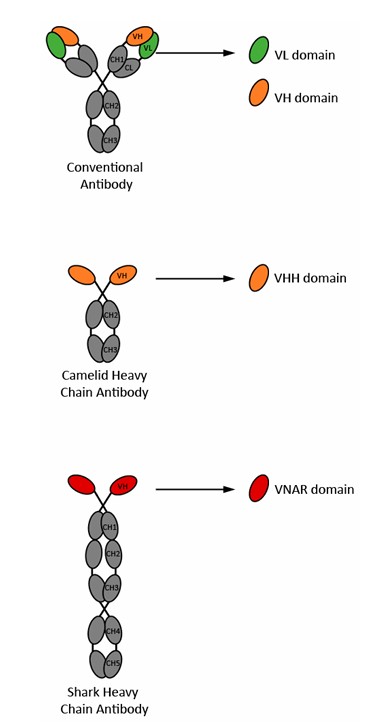Creative Biolabs is a leading service provider of VHH repertoire analysis. We have developed an advanced Magic™ VHH repertoire analysis platform for the identification of single domain antibody. Combined with our single domain antibody library service, we are able to provide custom VHH development service tailored to the unique requirements by our customers.
VHH is also known as single domain antibody. It is an antibody fragment consisting of a single monomeric variable antibody domain with binding ability to a specific target. VHH has a molecular weight of only 12-15 kDa, which is much smaller than the regular antibodies. They also have other distinct advantages over the regular antibodies. Compared to the common antibodies, single domain antibodies are easier to be isolated from the phage display panning procedure. They could be cultured in vitro with high concentrations. In addition, single domain antibodies are easier to be transformed into bacterial cells for bulk production because of their small sizes.
 Fig.1 Schematic representation of the four types of sdAbs.1
Fig.1 Schematic representation of the four types of sdAbs.1
The Magic™ VHH repertoire analysis we developed could facilitate the VHH identification process, allowing a deeper and broader understanding of the resulted VHH repertoire from a phage display screening. The high-throughput sequencing technologies could characterize the functional VHH repertoire in a large scale. It is also able to sequence the full-length paired heavy and light chains.
In this process, many technologies could be incorporated, such as linkage PCR and droplet PCR. Furthermore, the bioinformatics analysis of a clonal antibody family and the expression of the representative member produce the antibody could identify the specific antigens of the immune response, therefore study the mechanisms of the protective or pathogenic functions. The deep sequencing of the antibody repertoire could provide the novel diagnostic tool, therapeutic antibodies and reliable biomarkers for a variety of diseases.
The Magic™ VHH repertoire analysis provides a much larger sequencing capacity that is million folds of the conventional Sanger sequencing, allowing much more possibilities of selecting VHH with high affinity and specificity. Also, the quality and the diversity of the library could be ensured by the Magic™ analysis which eliminates the bias of the multiple rounds of selection required by the traditional sequencing method.
Creative Biolabs has more than a decade of experience on custom antibody development services. Combined with our phage display platform, Creative Biolabs provides one-stop service for VHH development, from immunization, library construction, screening, to antibody engineering. With the Magic™ VHH repertoire analysis, we are confident in offering the VHH production in a most effective and efficient manner.
Other optional antibody repertoire analysis services:
VHH repertoire sequencing analysis is a method used to explore the diversity of VHH sequences within an immune repertoire. VHH antibodies, also known as single domain antibodies (sdAbs), are derived from the heavy-chain-only antibodies found in camelids and consist solely of the variable domain of the heavy chain (VH). This sequencing technique provides detailed insights into the range and frequency of VHH antibodies, which are known for their small size, stability, and unique antigen-binding properties.
VHH repertoire sequencing focuses specifically on single-domain antibodies, which lack the light chain found in conventional antibodies. This method allows for the analysis of the smaller and more stable VHH domains, which are capable of binding antigens with high specificity and affinity. Conventional antibody sequencing typically involves both heavy and light chains, while VHH sequencing is limited to the single-domain structure, making it ideal for applications requiring small, stable, and highly specific antibodies.
VHH repertoire sequencing analysis is used in therapeutic antibody discovery, diagnostics, and research into immune responses. The unique properties of VHH antibodies, such as their small size and stability, make them ideal for use in therapies targeting difficult-to-reach epitopes, imaging agents, and biosensors. Additionally, VHH sequencing is valuable in studying immune responses in camelids and in developing VHH-based treatments for diseases.
VHH repertoire sequencing contributes to therapeutic development by identifying single-domain antibodies with high specificity and affinity for therapeutic targets. These sdAbs can be engineered into various formats, such as multivalent or bispecific antibodies, and used in treatments for cancer, infectious diseases, and autoimmune disorders. The small size and stability of VHH antibodies also make them suitable for delivery into challenging environments, such as the central nervous system or intracellular targets.
In cancer research, VHH repertoire sequencing is used to identify sdAbs that target tumor-specific antigens. By analyzing the VHH sequences from immune cells of camelids immunized with tumor antigens, researchers can discover sdAbs that bind to unique epitopes on cancer cells. These sdAbs can be developed into targeted therapies, such as sdAb-drug conjugates or bispecific antibodies, offering a novel approach to cancer treatment.
VHH antibodies, or sdAbs, offer several advantages over conventional antibodies, including smaller size, increased stability, and the ability to bind unique or hidden epitopes. Their small size allows for better tissue penetration and the potential to target intracellular antigens. VHH antibodies are also more resistant to extreme conditions, such as high temperatures or low pH, making them suitable for a wider range of applications, including therapeutics, diagnostics, and industrial use.
Bioinformatics can enable the processing, assembly, and interpretation of large volumes of sequencing data. Advanced algorithms are used to identify VHH clonotypes, analyze sequence diversity, and detect patterns relevant to antigen binding. Bioinformatics tools also facilitate the comparison of VHH repertoires across different conditions or immunization strategies, aiding in the discovery of functional sdAbs and guiding therapeutic development.
Use the resources in our library to help you understand your options and make critical decisions for your study.
All listed services and products are For Research Use Only. Do Not use in any diagnostic or therapeutic applications.
| USA:
Europe: Germany: |
|
|
Call us at: USA: UK: Germany: |
|
|
Fax:
|
|
| Email: info@creative-biolabs.com |
